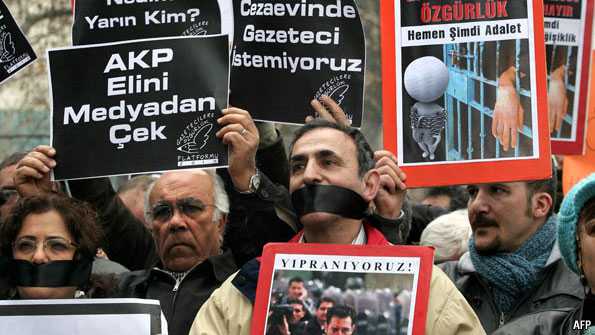More arrests stoke fears that the government is intolerant of criticism
Mar 10th 2011 | ISTANBUL | from the print edition

Let our people go
RECEP TAYYIP ERDOGAN, Turkey’s mildly Islamist prime minister, likes to boast that his Justice and Development (AK) party has transformed the country into a “forward democracy”. But the detention and imprisonment of two investigative journalists on March 6th looks very much like a step backwards.
The arrests of Ahmet Sik and Nedim Sener came at a time of growing concern about pressure on the media. Scores of journalists, many of them Kurds, are in jail. The European Union and America say they are worried. Thousands of Turks took to the streets in protest after the arrests.
Mr Sik and Mr Sener have been accused of involvement with the so-called Ergenekon gang, an organisation of generals and like-minded accomplices alleged to have plotted to overthrow AK. The investigation into Ergenekon, which began in 2007, marks the first time that serving generals have been called to account by civilians (albeit in controversial special security courts), and has offered an unprecedented glimpse into the army’s murky past.
Yet even AK’s biggest fans worry that the legitimacy of the Ergenekon case is being dented by heavy-handed tactics such as the arrests of Mr Sik and Mr Sener. Four years after the investigation began there have still been no convictions. Some suspects have yet to be charged. The investigation, say some, has become a mere pretext to round up the government’s critics. Last month police raided the offices of OdaTV, a website, and arrested three journalists on suspicion of inciting a coup.
Some argue that Turkey’s most influential Islamic brotherhood, led by Fethullah Gulen, a Pennsylvania-based imam, can be seen behind the recent wave of arrests. Nonsense, say Gulenists. Their movement is widely acknowledged as a moderate force. But critics claim that their penetration of the state, notably the police, has given them free rein to pursue their foes in the army and elsewhere.
Both journalists arrested last week had produced works that may have brought them enemies. Mr Sener is best known for a book that documents the complicity of the police in the 2007 murder of Hrant Dink, a Turkish journalist of Armenian origin. At the time of his arrest Mr Sik was about to publish a book on the influence of the Gulenists within the security forces. “Whoever touches [them] burns,” Mr Sik shouted as he was arrested.
Zekeriya Oz, the chief Ergenekon prosecutor, said the pair were arrested not because of their writings but because of “other activities” that he was, for the time being, “unable to reveal”. Yet leaked transcripts of their interrogations show that Mr Oz grilled them about several books, including one written by a former police chief, Hanefi Avci, which also attacks the Gulenists. (Shortly after its publication, Mr Avci, a self-avowed religious conservative, was imprisoned for his alleged membership of an obscure left-wing faction.)
Emma Sinclair-Webb of Human Rights Watch, an advocacy group, points out that the use of secret evidence means that defendants cannot challenge their detention. The longer it remains secret, the louder the protests are likely to be.
from the print edition | Europe
via Press freedom in Turkey: A dangerous place to be a journalist | The Economist.